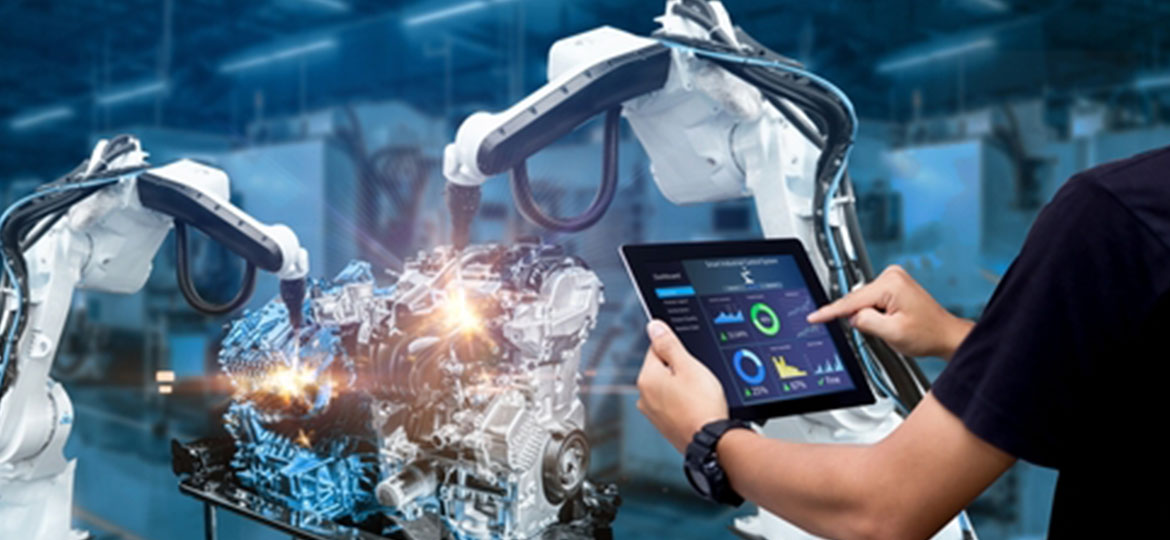Digital Revolution in the Industrial World: Optimizing Efficiency Through Digital Manufacturing Systems

DMS enables companies to enhance operational efficiency through the automation of various stages of production. Automated processes reduce production time, eliminate unnecessary activities, and enhance overall output.
In the era of the fourth industrial revolution, the concept of Digital Manufacturing System (DMS) serves as a foundation for significant transformation in the manufacturing world. DMS introduces breakthroughs by integrating digital technology throughout the entire production cycle, from planning to supply chain management.
Essentially, DMS creates an ecosystem that allows companies to optimize their manufacturing processes by leveraging real-time data, artificial intelligence, and seamless connectivity. Through this discourse, we will explore the essence of the Digital Manufacturing System and how this concept becomes key to improving efficiency and competitiveness in the industry.
Basic Concepts of Digital Manufacturing System (DMS)
Definition and Scope
In the context of Digital Manufacturing System (DMS), the definition and scope encompass all aspects involved in implementing digital technology in manufacturing processes. DMS is a holistic approach involving the integration of information technology, data processing, and artificial intelligence. This definition includes a profound understanding of how DMS updates production planning, supply chain management, and overall manufacturing process execution.
Key Components
The main components of the Digital Manufacturing System include the technological infrastructure supporting digital integration. This involves the use of smart sensors for monitoring and data collection, production information systems for real-time data analysis, and artificial intelligence software for automated decision-making. These components work together to create an environment where data can be easily accessed, intelligently analyzed, and implemented to improve efficiency and quality throughout the production cycle.
Relationship with Industry 4.0
Digital Manufacturing System is a cornerstone in the Industry 4.0 concept. Its relationship with Industry 4.0 emphasizes the use of digital technology to achieve automation, better connectivity, and adaptable production. DMS benefits from the Industry 4.0 revolution by incorporating elements such as the Internet of Things (IoT), big data analytics, and artificial intelligence into the manufacturing processes.
This integration allows companies to be more responsive to market changes, improve operational efficiency, and create more innovative products.
Benefits of Digital Manufacturing System
Increased Production Efficiency
DMS leverages automation technology to optimize every stage of production, from planning to delivery. Real-time data integration enables direct monitoring of machine performance, raw material usage, and workforce productivity. DMS allows for stricter quality monitoring and control. Through sensors and data analysis, companies can quickly detect defects or changes in quality, minimize production errors, and improve product quality.
Thus, companies can identify areas that need improvement, reduce production cycle times, and significantly increase output.
Flexibility in Production Processes
With advanced automation technology, companies can easily adjust and configure production lines to meet changes in market demand or evolving production requirements. The modular concept in DMS allows for easy integration of new equipment or software updates, providing the flexibility needed to remain competitive in a dynamic business environment.
In other words, DMS enables companies to adjust production more flexibly. Automation processes can be quickly reconfigured to accommodate changes in market demand or company production policy changes.
Cost Reduction and Risk Management
DMS can significantly reduce production costs through operational efficiency and waste reduction. Through accurate monitoring, companies can manage inventory and supplies more efficiently, reduce waste, and optimize resource usage. Additionally, deep data analysis allows companies to identify potential operational risks or improvement needs, minimize the likelihood of errors, and improve accurate predictions.
Risk management is also enhanced through better monitoring of safety and occupational health. DMS enables quick identification of safety issues and allows companies to implement more effective preventive measures.
Digital Manufacturing System Dimension Model
Simulation
Simulation in the context of the DMS Dimension Model may involve the use of simulation software to replicate production processes or manufacturing systems virtually. This allows companies to test and validate design concepts, identify potential issues, and conduct experiments without disrupting real operations. Simulation can also aid in capacity planning, supply chain management, and the development of more efficient production strategies.
Analysis
The analysis dimension involves using data analysis and artificial intelligence to gain in-depth insights into the operational aspects of DMS. It includes monitoring production performance, identifying trends, and analyzing real-time data to make more informed decisions. This analysis can include evaluations of efficiency, quality improvements, and continuous improvements based on operational data evaluations.
Equipment and Processes
The focus of this dimension is a deep understanding of the equipment and processes involved in DMS. It includes real-time monitoring and maintenance of equipment, understanding how equipment interacts with each other, and how production processes can be optimized effectively. Understanding these equipment and processes allows companies to identify improvement opportunities, reduce downtime, and improve operational efficiency.
Technologies Underlying Digital Manufacturing System
Internet of Things (IoT) in Manufacturing
IoT technology plays a key role in DMS by enabling connectivity and communication between physical devices. At the production level, connected sensors on equipment and machines collect real-time data useful for monitoring equipment conditions, performance measurements, and machine health monitoring. IoT also facilitates better integration between various systems in the manufacturing environment, forming a network that allows information exchange without barriers.
Artificial Intelligence (AI) and Machine Learning
The use of artificial intelligence (AI) and machine learning (ML) takes DMS to the next level. AI enables systems to make smarter and automated decisions based on complex data analysis. Machine learning, as part of AI, can process historical data to identify patterns, predict future events, and automatically improve operations. By implementing AI and ML in DMS, companies can improve efficiency, optimize production, and respond quickly to dynamic changes in the business environment.
Big Data Analytics for Decision Improvement
Big data analytics is a key element in DMS that allows companies to process and analyze large volumes of data generated by various sources. This data analysis provides in-depth insights into manufacturing operations, helping in better decision-making. By leveraging big data analytics, companies can identify trends, optimize supply chains, reduce production costs, and design more effective strategies to enhance competitiveness.
Recent Developments and Trends in Digital Manufacturing System
Latest Technology Innovations
Recent developments in Digital Manufacturing System (DMS) include a series of ongoing technological innovations. One major trend is the integration of Augmented Reality (AR) and Virtual Reality (VR) technologies into the manufacturing environment. AR and VR provide enhanced experiences for employee training, machine maintenance, and product design. Additionally, advancements in sensor technology, such as multispectral and sound sensors, further enhance DMS's ability to collect diverse and accurate data. The integration of Quantum Computing also begins to show potential for addressing complex computational challenges in data analysis and production planning.
Global Adaptation and Application in Specific Industries
Globally, industries are increasingly recognizing the value of DMS implementation, with many companies adopting digital manufacturing strategies. There is a strong trend towards "smart factories" or fully connected and automated factories. The application of DMS is not limited to conventional manufacturing industries but is also entering sectors such as energy, healthcare, and automotive. Increased collaboration among companies in the supply chain is also a trend, allowing more efficient data exchange and better production coordination.
Benefits of Digital Manufacturing System for Your Business
Improved Operational Efficiency
DMS enables the optimization of production processes and supply chain management through automation, real-time monitoring, and data analysis. This leads to reduced production cycle times, more efficient resource usage, and an overall improvement in operational efficiency.
Higher Product Quality
Through careful monitoring and control, DMS helps detect and prevent product defects. This not only improves product quality but also reduces the risk of waste and production costs associated with defective products.
Flexibility in Adapting Production
With DMS integration, businesses can quickly adjust their production to respond to changes in market demand or operational conditions. This flexibility allows for better adaptation to changes in the business environment.
Increased Product Innovation
DMS provides access to in-depth data on production processes and customer feedback. This opens up opportunities for product innovation, new product development, and continuous improvements based on accurate data analysis.
Lower Operational Costs
Through operational efficiency and better supply chain management, DMS can help reduce overall operational costs. Optimizing resource usage, proper inventory management, and real-time monitoring can reduce waste and improve profitability.
Examples of Digital Manufacturing System Technology Implementation in Your Business
Automated Equipment Monitoring
Integrating sensors and monitoring technology into production machines to detect potential issues, reduce downtime, and extend equipment life.
Use of Production Information Systems
Implementing connected production information systems to manage and monitor production processes in real-time, enabling team leaders to make faster and more accurate decisions.
Implementation of IoT in Equipment Maintenance
Using the Internet of Things (IoT) to connect equipment and machines to provide real-time data on their health and performance, enabling preventive maintenance and more efficient maintenance management.
Big Data Analytics for Production Prediction
Using big data analytics to analyze historical production data and predict market demand, helping companies plan production more accurately and optimize inventory.
Use of AR/VR Technology for Employee Training
Implementing Augmented Reality (AR) or Virtual Reality (VR) technology to train employees in production processes or equipment maintenance, improving efficiency and worker safety.
Conclusion
Digital Manufacturing System (DMS) marks an industrial transformation with a bright future. Supported by technologies such as IoT, AI, and Big Data, DMS brings operational efficiency, high product quality, and production flexibility. Recent innovations, such as AR, VR, and Quantum Computing, underline a smart and connected future. Global adoption of DMS involves diverse sectors, playing a central role in digital transformation. Implementing DMS in business opens opportunities for efficiency and innovation. With a focus on technology adaptation, Circular Economy concepts, and cybersecurity, DMS heads towards the peak of innovation and sustainability, continuously driving change in the global manufacturing paradigm.
Other News


